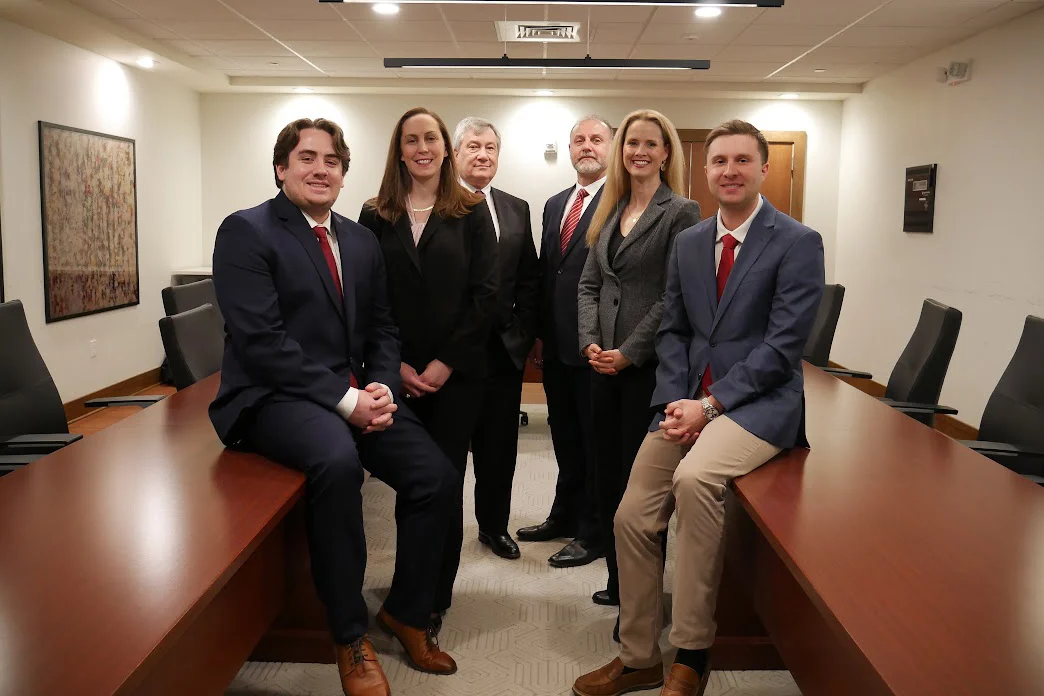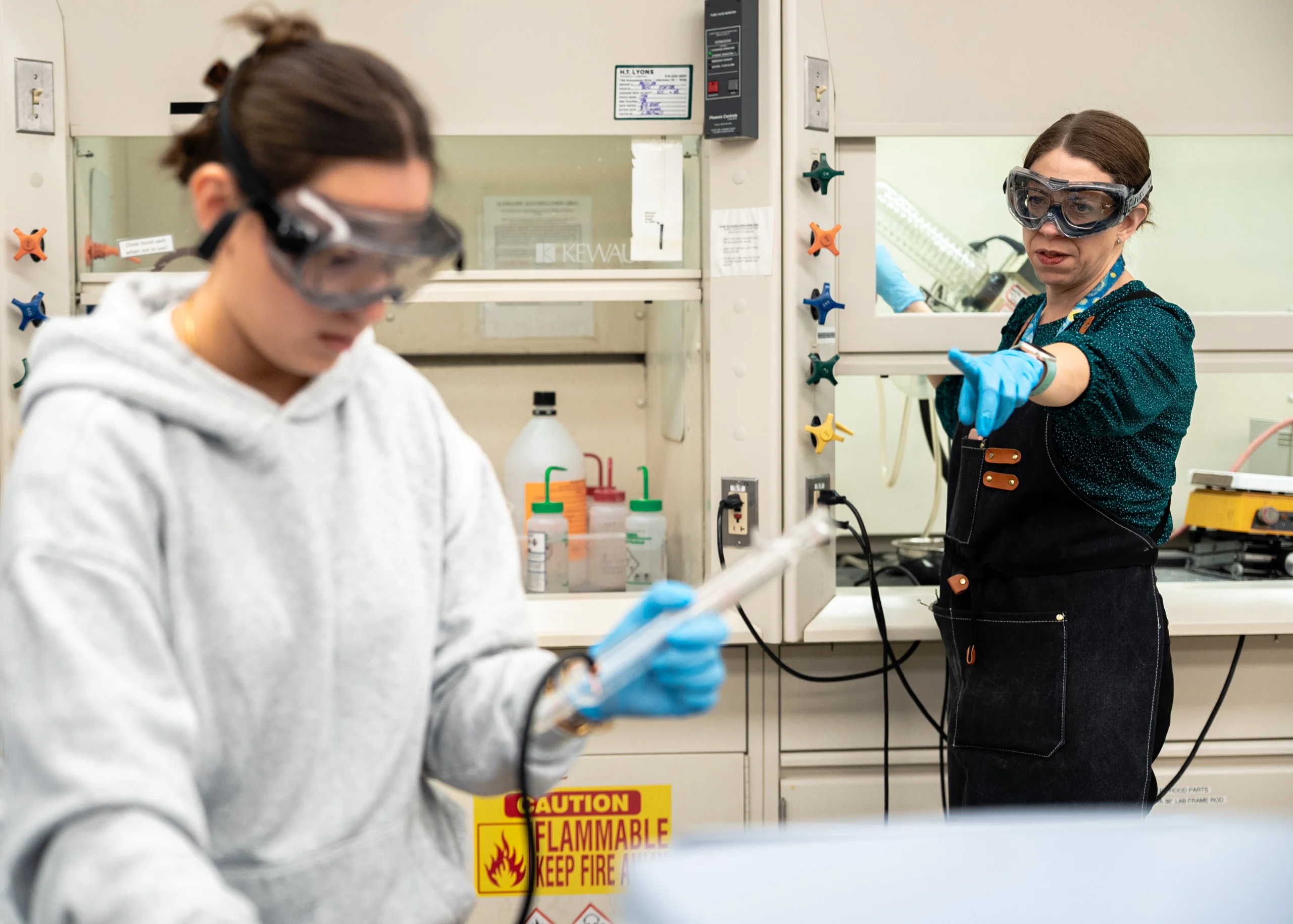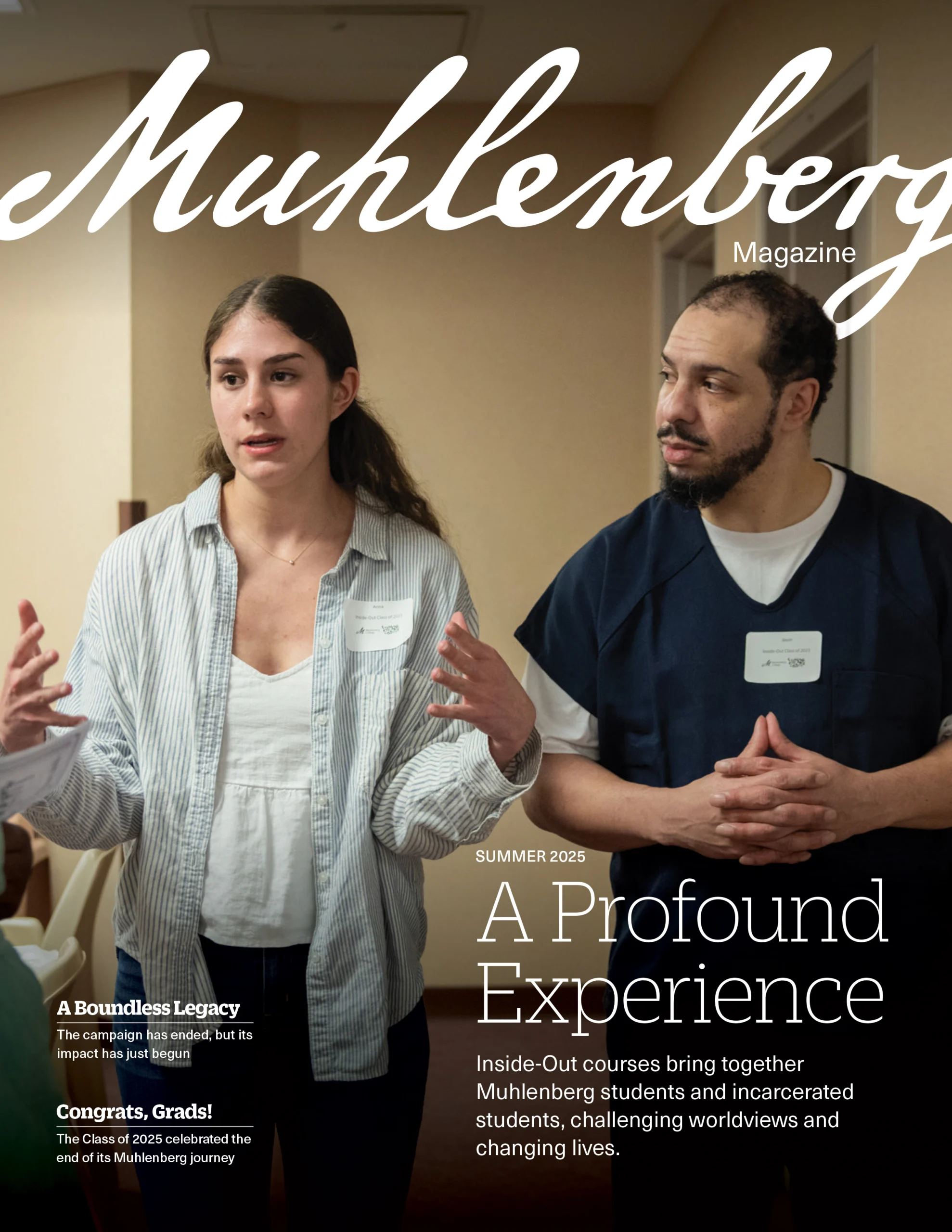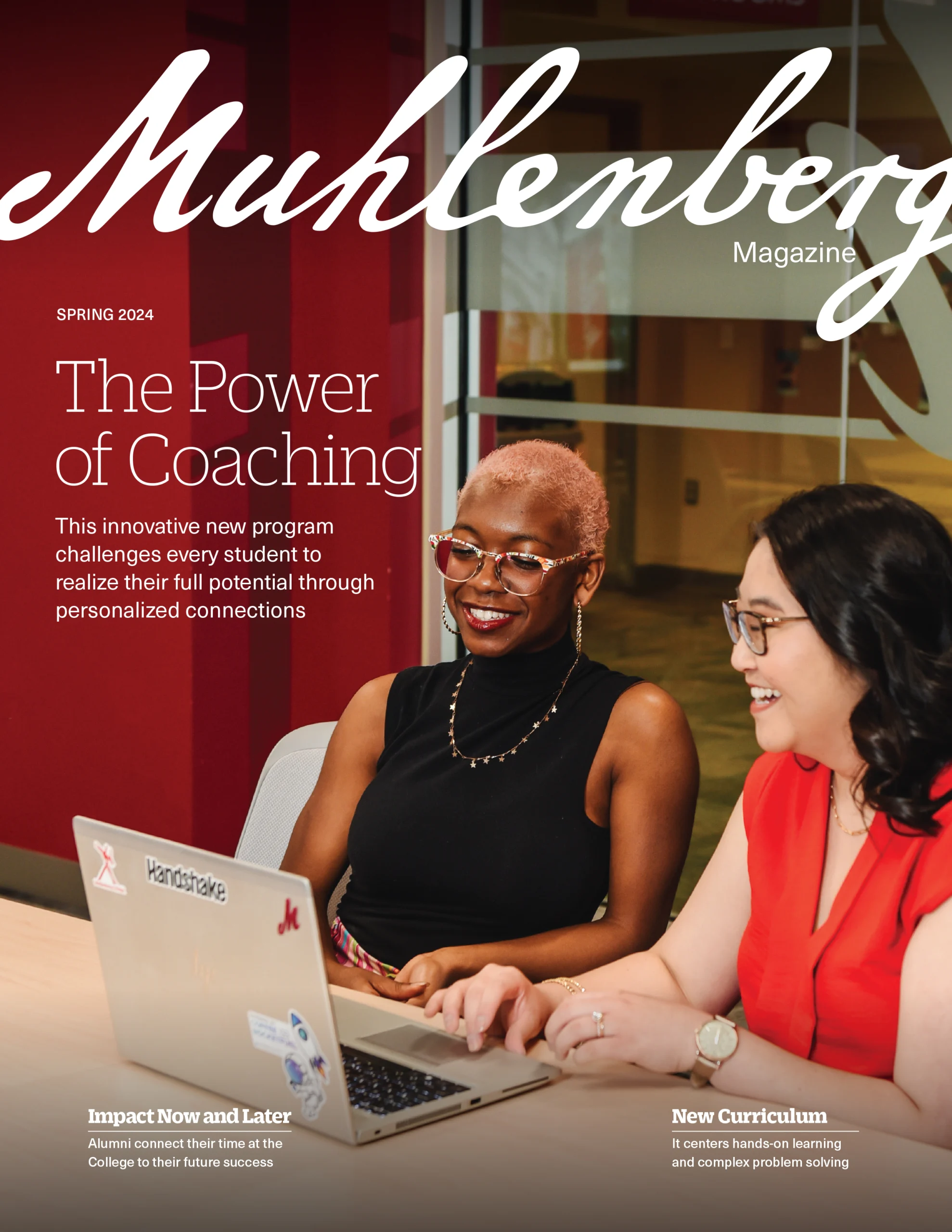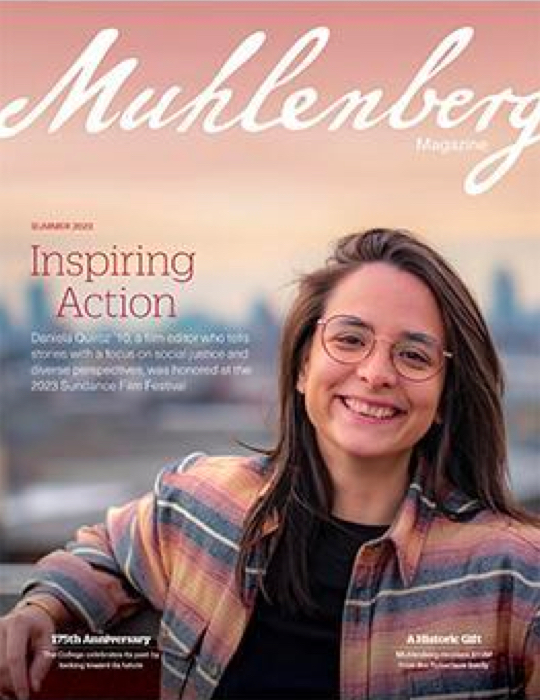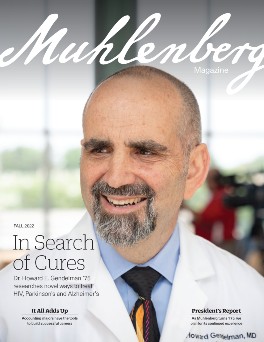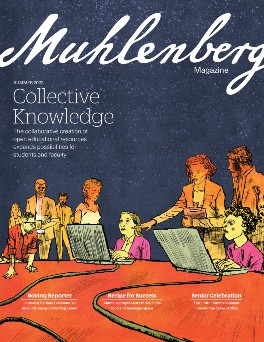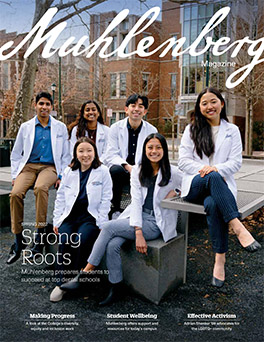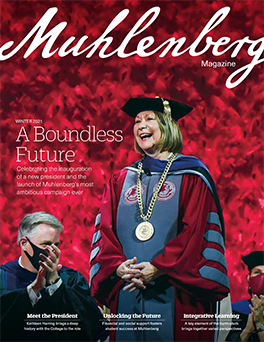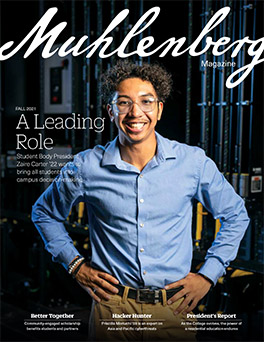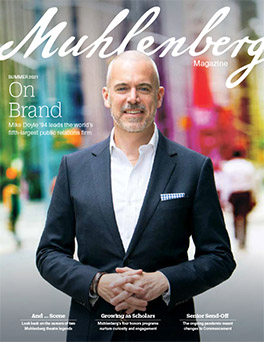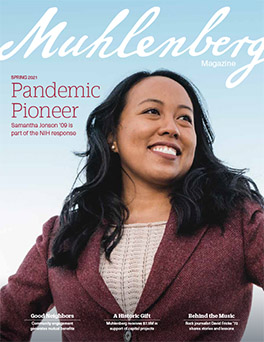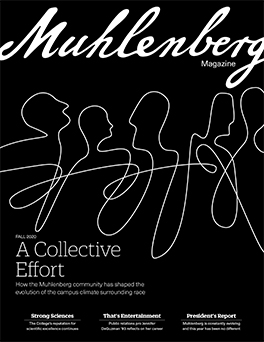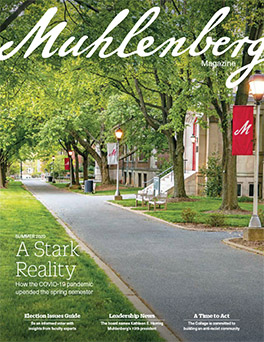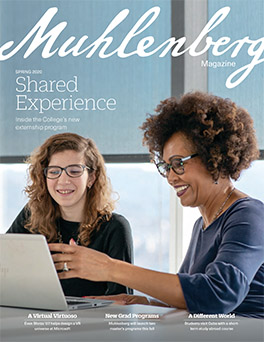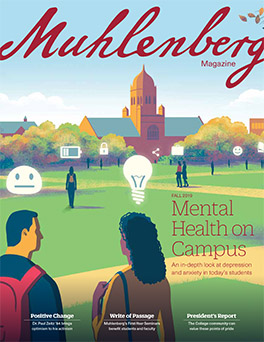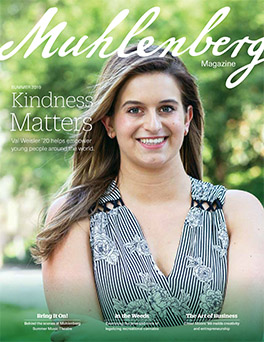
It All Adds Up
The College’s Accounting Program stands out from those of peer institutions because its graduates combine certified public accountant (CPA) exam readiness with liberal arts sophistication in just four years of study.
After graduation, Doug Dulaney ’12, a theatre and accounting double major, moved to New York City with some of his actor buddies. His friends were planning to audition, and part of him longed to join them. But, he had lined up a job at Pricewaterhouse-Coopers (PWC), one of the “Big Four” accounting firms, and Muhlenberg’s accounting faculty had assured him that starting his career at a Big Four firm would open up a world of possibilities. He would work there as an associate while preparing to sit for his certified public accountant (CPA) exam.
Dulaney stayed at PWC for less than two years — entry-level accounting jobs at big firms sometimes lack work-life balance — but his experience there delivered as promised. “After that, pretty much everywhere I interviewed, I got an offer,” he says.
He wanted to move back to his hometown of Boston, and he wanted more time to pursue acting. When he realized his next job, in private equity, would not give him that time, he started doing accounting for arts nonprofits. He’s stayed in the nonprofit space ever since.
“If you’re working in an arts organization and you’re an artist on the side, people get it,” says Dulaney, who managed the finances at a music venue and a theatre before securing his current role as assistant controller of budgeting and operations at Boston’s Museum of Science. “If you say, ‘I’m going to audition, I’m going to film something,’ my coworkers will say, ‘That’s awesome that you’re engaging in the field you’re working in.’ I get to live my life in all aspects.”
Muhlenberg’s Accounting Program sets students up for this type of success by allowing them to explore their other interests while still providing rigorous preparation for an accounting career. One crucial factor that sets the College’s program apart from those of most of its peer institutions is that students graduate with enough credit hours to sit for the CPA exam.
“Being able to get all the credits I needed to sit for my CPA exam right away was really, really helpful,” says Alyssa Pezzella Ehrgood ’09, a sales accounting manager for The Hershey Company who started her career at Deloitte, another Big Four firm. “I didn’t have to pay for extra classes or do any type of grad school.”
Because students can sit for the CPA exam right after graduation, Muhlenberg’s accounting faculty make it their mission to ensure that students who choose to do so will succeed, meeting the specific requirements in the state they’d like to practice in. What that requires is close faculty mentorship, a curriculum that responds to changes in the accounting field and a focus on ensuring that students are prepared for the interview process as well as their entrance into the business world.
“Accounting is preprofessional in a way that other traditional liberal arts disciplines are not,” says Trevor Knox, associate professor of accounting and economics and director of the Accounting Program. “We would lose part of our relevance if we weren’t staying in touch with what employers were looking for.”
One barometer of the program’s success is its job placement rate. Every student in the Class of 2022 who earned an accounting degree and who wanted to enter the workforce (versus, say, going on to a graduate program) had a job upon graduating. Another is its reputation, which has been forged in part by the success of its graduates. For example, both Associate Professor of Accounting Ermira Mazziotta and Assistant Professor of Accounting Ellen Rackas have been invited to attend Deloitte University, a campus in Texas where Deloitte runs educational and leadership programming for employees, potential employees, clients and contacts inside higher education. Faculty from small schools aren’t typically invited.
“I asked why we were selected,” Mazziotta says. “In feedback from Deloitte, our alumni rose to the top in terms of retention — how long they stayed with the company — and quality of the work, how well they performed. That’s why Muhlenberg stands out.”
“We have a strong Accounting Program grounded in the liberal arts, and our students get fantastic job opportunities as a result,” says Provost Laura Furge. “Our accounting faculty are intentional in the way they have built our program to be continuously up to date and relevant while also supporting student needs and varied interests for a life of learning. Muhlenberg provides a challenging yet supportive environment where students can thrive.”
“Our alumni rose to the top in terms of retention … and quality of the work, how well they preformed. That’s why Muhlenberg stands out.”
Ermira Mazziotta, Associate Professor of Accounting
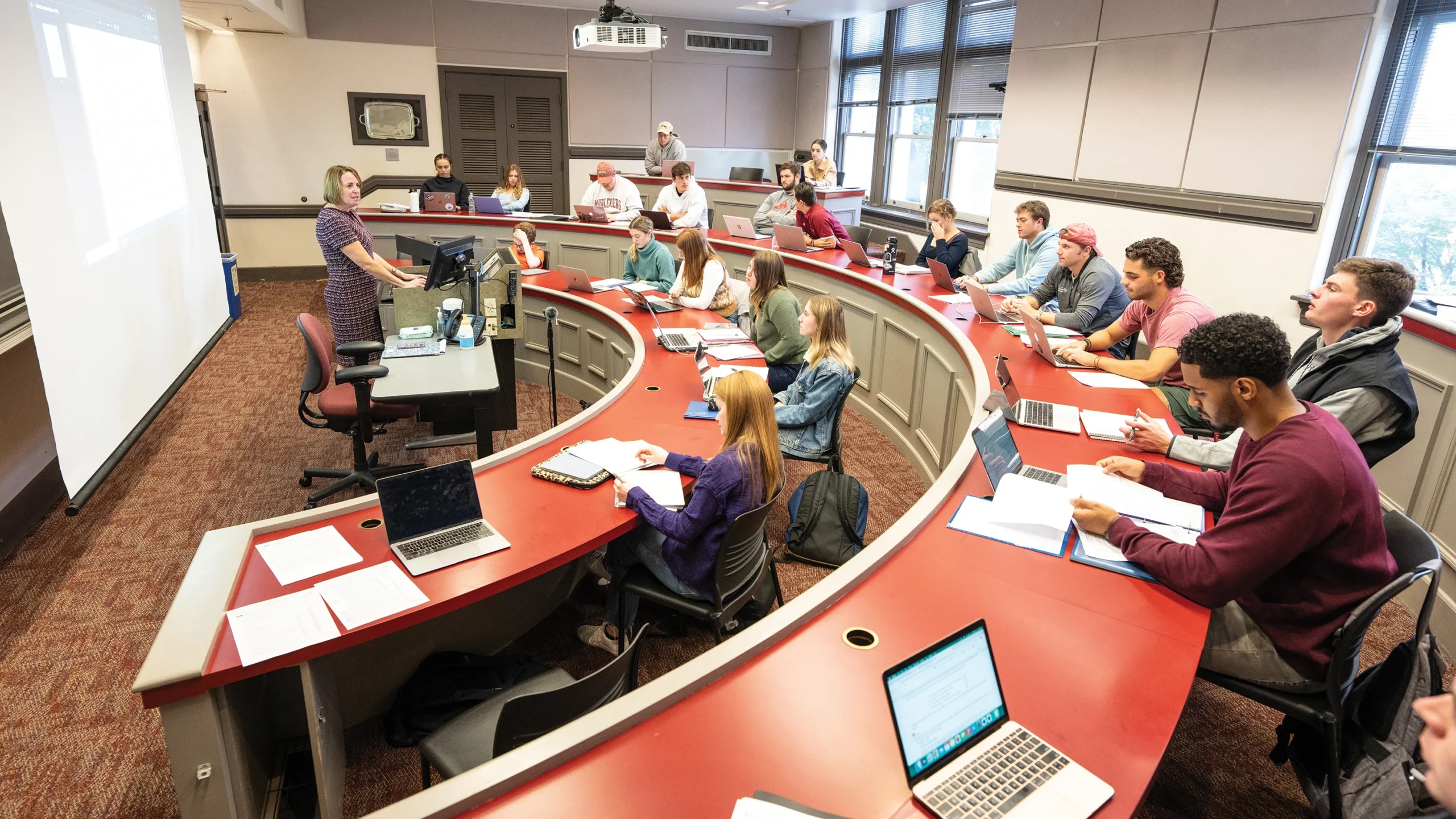
“Our accounting faculty are intentional in the way they have built our program to be continuously up to date and relevant while also supporting student needs and varied interests for a life of learning.”
Provost Laura Furge
Faculty Mentorship
Muhlenberg’s accounting faculty, going back to Associate Professors Emeritae Paula Irwin and Jamie Doran, all began their careers in public accounting. Current faculty continue a tradition of providing close advising from the moment a student declares an accounting major. At the start of each semester, there’s a group advising session for new majors to acquaint them with the requirements for the major as well as the specific requirements of the states where they may want to sit for the CPA exam. Then, each student has a faculty advisor within accounting who can help them navigate their own particular path.
The CPA exam requires 150 credit hours, which is more than the 128 credit hours required to graduate with a bachelor’s degree from Muhlenberg. This is one reason so many accounting students end up double majoring: The process of tailoring the additional coursework to coincide with student interests often results in the natural addition of a double major.
“Muhlenberg manages to squeeze [150 credit hours] in in four years, but they do such a great job, because it doesn’t feel like you’re running like wild,” says Christian Lopez ’18, an accounting and economics double major who’s now a senior analyst at the solar company Safari Energy, LLC. “Your advisor helps you know how to pair your classes up properly so you can space out the difficult courses and have a full schedule but not feel like you’re losing out on life.”
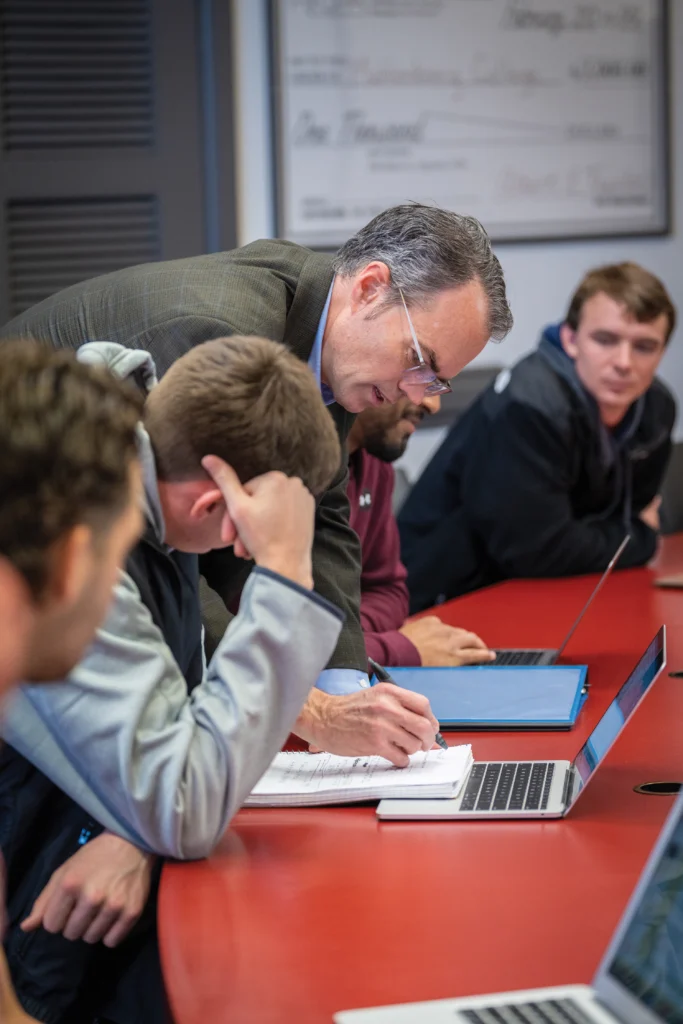
Whether they choose to double major in a related discipline (like finance) or something completely different (like dance) depends, in part, on the state with the strictest requirements of those where they may want to practice. For example, New Jersey requires students to take courses in related fields in order to qualify for the CPA exam, so many students who aspire to work in that state double major in another subject that’s part of Muhlenberg’s combined Department of Accounting, Business, Economics and Finance.
Faculty advisors also assist students in fulfilling the specific requirements to sit for the exam in a particular state. New York requires accounting coursework that goes beyond the regularly offered in-semester Muhlenberg courses, so the College offers a for-credit internship that fulfills that requirement (and faculty work over the summer as students’ internship advisors). Faculty helped a student who was hoping to sit for the CPA exam in California find a remote class to fulfill the state’s specific ethics requirement. It’s an intensive process that’s unique to each student, because students who hope to complete all that’s required in just four years can’t afford to miss anything.
“We are constantly working with them,” says Mazziotta, who likens the process to prehealth advising. “We want to make sure that every student has the opportunity to qualify in the state of their choice.”
A Responsive Curriculum
The Accounting Program’s curriculum is designed to prepare students to excel on the CPA exam as well as in their actual work as public accountants. Knox says that, whenever the content of the CPA exam changes, the curriculum is adjusted accordingly. Mazziotta says that faculty use the weekly reflections from students doing for-credit summer internships to make changes to the program that correspond with the skills students need to succeed in the profession.
For example, Rackas says, Excel experience has become so important that faculty have changed their upper-level courses to incorporate much more Excel training. Instead of having a single class on Excel, it’s embedded in all accounting students’ coursework because it will be embedded in nearly all their professional work as well. This requires faculty to coordinate what will be taught in each class, but it allows students to build a broader and deeper knowledge that they’re constantly expanding.
“At Muhlenberg, we had an Excel textbook, and we took exams on Excel, and I thought that was just normal,” says Vanessa Rowan ’08, a dance and accounting double major who did accounting for The John F. Kennedy Center for the Performing Arts before landing her current role as a director of finance & accounting at the charter school nonprofit Building Hope. “Every place that I’ve gone in my career, I’ve seen that a lot of people don’t have that background in Excel that I have. It got me placed on bigger projects when I was in public accounting, and it helps a lot every day when I’m just looking for a more efficient way to do something.”
“Once students declare an accounting major, we very much treat our classes as their first step toward their professional goals. All student communication is professional.”
Ellen Rackas, Assistant Professor of Accounting
The Accounting Program also seeks to instill the skills required in any workplace: professional behavior, clear written and verbal communication and the ability to present information to a group with confidence: “Once students declare an accounting major, we very much treat our classes as their first step toward their professional goals,” Rackas says. “All student communication is professional.”
As another example, in one upper-level accounting course, student groups were required to write a script that would allow them to role-play a real-world situation an accountant might face when dealing with a client. For their final project, Knox reserved Empie Theatre to allow students to act out their scripts.
“My perspective is that those students who are pursuing in-depth an unrelated major tend to be the ones who have the higher emotional intelligence, who are more sensitive to nonverbal cues, who are more attuned to aspects of presentation style than students who aren’t performers,” Knox says. “Part of what we try to do in our program is bring a little bit of that into the curriculum for everyone.”
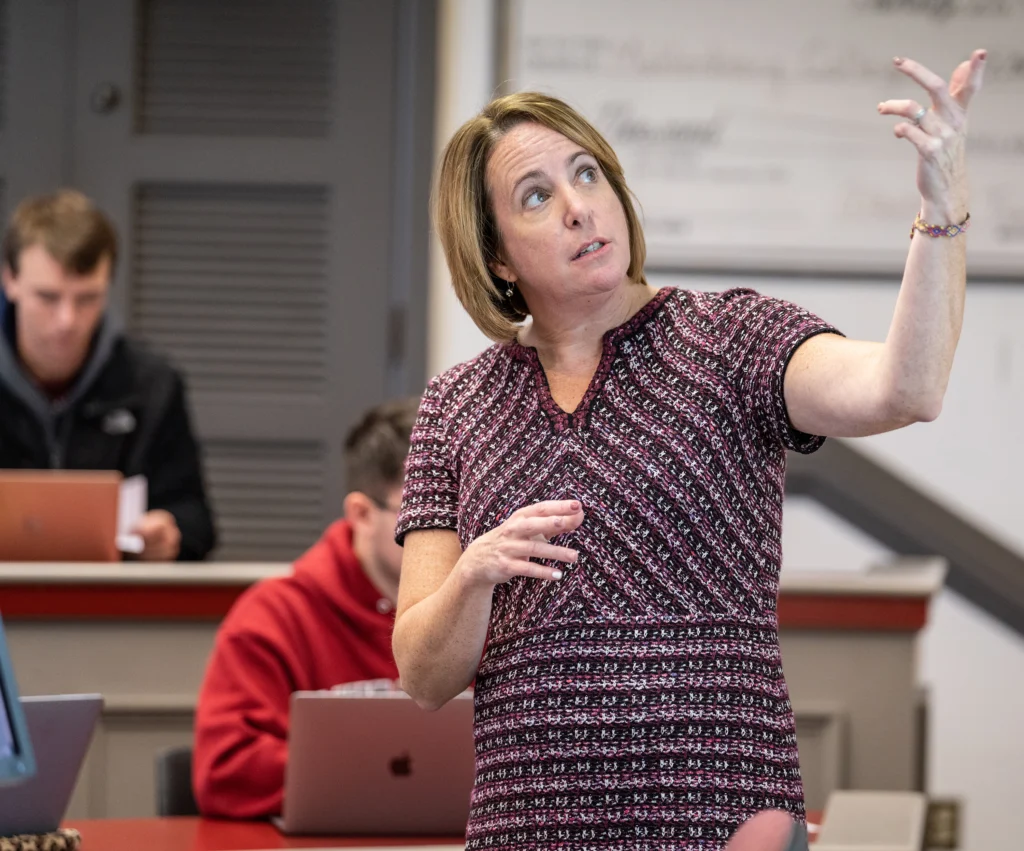
“Our accounting majors are looking at things more holistically, so they can put information in context, and that allows them to stand out not just technically or professionally but personally.”
Trevor Knox, Associate Professor of Accounting & Economics, Director of the Accounting Program
A Focus on Career Readiness
Another part of the curriculum is rigorous job application and interview preparation. Large firms offer post-sophomore-year leadership programs, and almost all firms offer post-junior-year internships. Either can be the first step toward a job offer. Students must be prepared, sometimes as early as midway through their sophomore years.
“We take it upon ourselves to get them ready,” Mazziotta says. “The way we view it is, whenever they interact with anybody, they’re representing Muhlenberg.”
Preparation begins with resume-building. Over this past summer, Knox was working with rising sophomore accounting students on their resumes. Partners in the Career Center took a first pass, then Knox took a second pass. This work used to take place at the start of the academic year, but that’s no longer soon enough.
“That timeline has accelerated in part because we have recruiters, often from Deloitte, on campus in early September,” Knox says. “Students’ resumes need to be ready to go. We’ve reorganized our timeline a little bit in order to make sure students are prepared when the job opportunities are available.”
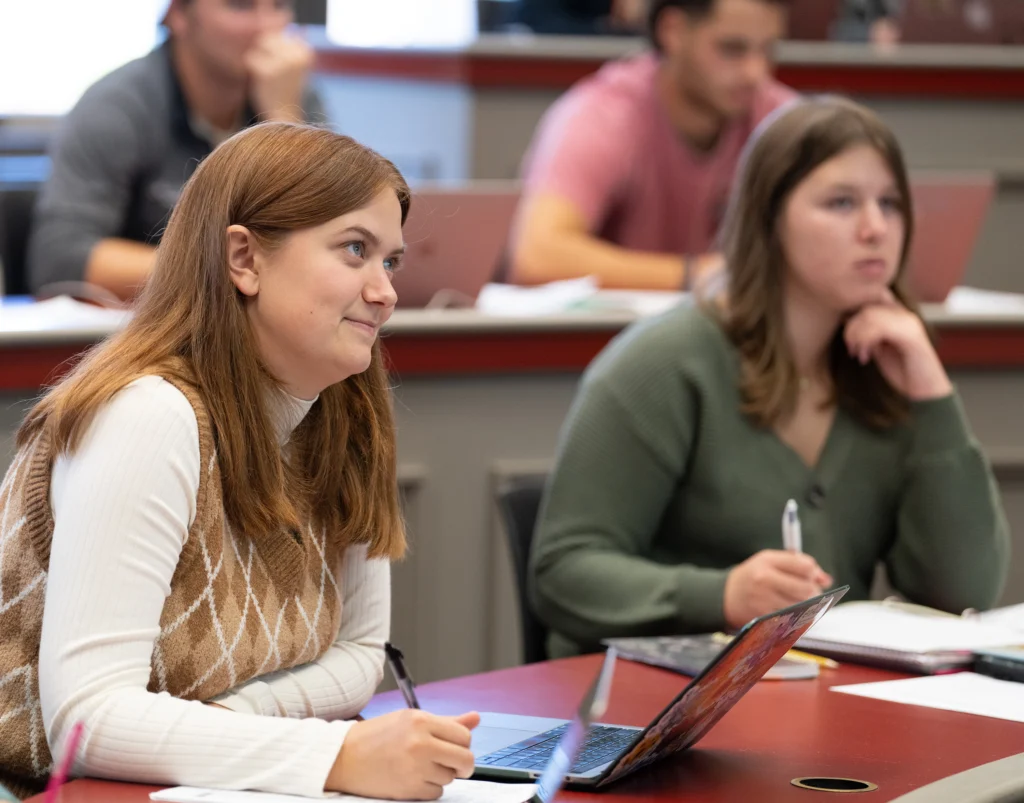
The Career Center’s relatively new space — it was renovated in 2017 — serves as a hub when recruiters come to campus. Its job and internship platform, Handshake, offers a variety of other opportunities, and accounting faculty and Career Center staff ensure that accounting students are aware of the possibilities.
The next step is interview readiness. Even before COVID began, the Career Center offered students access to Big Interview, a web-based platform meant to help them prepare for online interviews, which have become increasingly common in the last few years. Career Center staff will also rehearse with students, staging mock interviews in their office.
“The Career Center did a great job helping me clean up my resume and understand how to articulate my experiences in a way that would be valuable in the marketplace for work. I did a lot of mock interviews,” says Lopez, whose first job out of College was at the Big Four firm KPMG. “Muhlenberg having such a great connection with the Big Four, a lot of them come to the College to interview the accounting students. I had my first Big Four interview in the Career Center. They’ve done a great job of keeping those connections and having a way for students to smoothly transition into corporate America.”
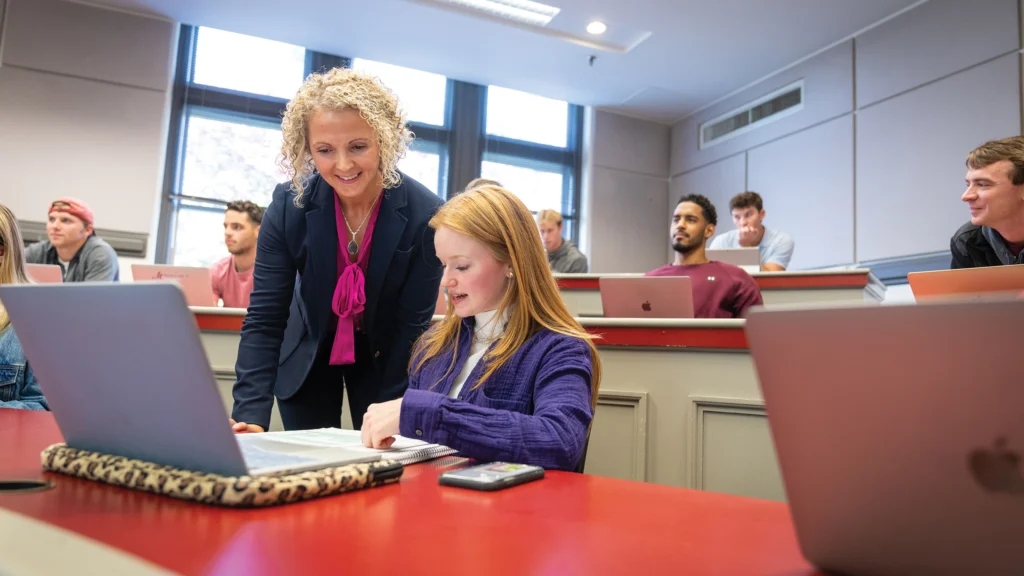
The Liberal Arts Advantage
Once the students reach the professional world, whether that’s through a leadership program or an internship, what makes them stand out is their well-roundedness. While business school students may arrive at those undergraduate opportunities with more in-depth accounting knowledge, “our students prove over and over their ability to both critically think and to communicate effectively,” Rackas says.
The breadth of knowledge developed at Muhlenberg also serves graduates well once they enter the workforce. Sami Unger Horrow ’10, an accounting and mathematics double major who’s been with Deloitte for her whole career, focuses on tech companies in her current role at the firm despite not having a tech background.
“My first manager, I asked him, ‘Why did you pick me? Why did you want me on your project?’ And his response really stuck with me: ‘The way that people with backgrounds like yours go about solving problems is something that we need,’” she recalls. “Because I have the liberal arts, I just think in a very different way than [business school graduates].”
Muhlenberg’s Accounting Program curriculum produces graduates with a well-rounded knowledge of accounting and professionalism. On top of that, Muhlenberg’s general curriculum, with its emphasis on making strong writers out of all students and its requirements for human difference and global engagement courses as well as integrative learning courses, produces graduates who can adapt to an infinite number of workplaces and on-the-job challenges.
“Having those multiple perspectives is a way that allows our students in accounting to have more interesting and valuable things to say about their accounting work. They can talk about it in terms beyond whether the balance sheet balances and ratios are looking healthy,” Knox says. “Our accounting majors are looking at things more holistically, so they can put information in context, and that allows them to stand out not just technically or professionally but personally.”

